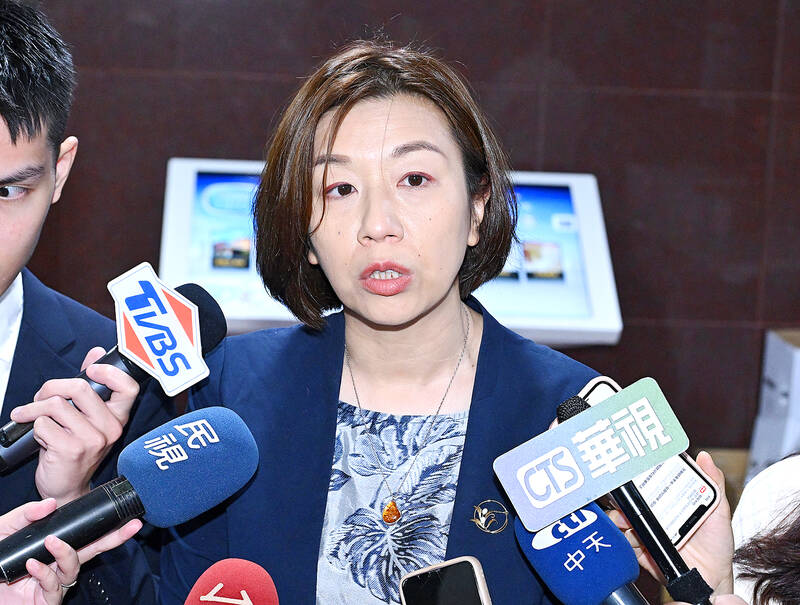The Ministry of Health and Welfare (MOHW) on Friday said it is mulling creating regulations forbidding aesthetic medicine practitioners from using phrases such as “sleeping comfortably” to gloss over the dangers of general anesthesia.
The ministry said it was made aware of a recent case in which a 40-year-old female visited a clinic in Taipei’s Zhongshan District (中山) for a thermage comfort pulse technology (CPT) session, but experienced insufficient oxygen saturation after general anesthesia and was pronounced dead after being taken to a hospital.
Deputy Minister of Health and Welfare Lin Ching-yi (林靜儀) said the ministry concluded that phrasing general anesthesia as shu mian (舒眠), “or acts to help one sleep more comfortably,” was misleading.

Photo: Liao Chen-huei, Taipei Times
The public should be aware that anesthesia is invasive and comes with certain risks, and the ministry would implement regulations banning the use of phrasings that insinuate that anesthesia is like going to sleep, she said.
Anesthesiologists must assess the risks of administering anesthesia prior to surgeries, and consent form must be signed, Lin said.
The number of anesthesiologists should not be an issue, but the medical industry was more lacking in qualified surgeons, she said, adding that the ministry would launch a review to find out if there are instances of a shortage of anesthesiologists for surgeries and emergency medicine.
Commenting on the Legislative Yuan’s proposal that cardiovascular surgeons and transplant surgery doctors be allowed to approve the use of anesthetics after training, Lin said the ministry would discuss the proposals with the Taiwan Society of Anesthesiologists before arriving at a decision.
Regarding whether there is a shortage of anesthesiologists, Lin said the industry should discuss what procedures require anesthesia and if there are enough anesthesiologists before the issue can be addressed.
Anesthesiologists should be dispatched to emergency medicine or other surgical procedures based on their scale, difficulty and necessity, but there are already special committees that handle that distribution, Lin said.
The aesthetic medicine industry should seek professional assistance should there be non-necessary services that require anesthesia, she said.
Many young doctors enter aesthetic medicine after their postgraduate year of training without further specialized training, Lin said, adding that that was a worrisome development.
The Regulations for Using Specialized Equipment for Medical Examinations (特定醫療技術檢查檢驗醫療儀器施行或使用管理辦法) state that invasive or highly technical operations must be conducted by certified dermatologists or plastic surgeons.
Lin said that aesthetic medicine remains an industry where implementing government oversight is difficult and, at present, the government can only ask that the industry police itself and maintain high standards.

The Coast Guard Administration (CGA) yesterday said it had deployed patrol vessels to expel a China Coast Guard ship and a Chinese fishing boat near Pratas Island (Dongsha Island, 東沙群島) in the South China Sea. The China Coast Guard vessel was 28 nautical miles (52km) northeast of Pratas at 6:15am on Thursday, approaching the island’s restricted waters, which extend 24 nautical miles from its shoreline, the CGA’s Dongsha-Nansha Branch said in a statement. The Tainan, a 2,000-tonne cutter, was deployed by the CGA to shadow the Chinese ship, which left the area at 2:39pm on Friday, the statement said. At 6:31pm on Friday,

The Chinese People’s Liberation Army Navy’s (PLAN) third aircraft carrier, the Fujian, would pose a steep challenge to Taiwan’s ability to defend itself against a full-scale invasion, a defense expert said yesterday. Institute of National Defense and Security Research analyst Chieh Chung (揭仲) made the comment hours after the PLAN confirmed the carrier recently passed through the Taiwan Strait to conduct “scientific research tests and training missions” in the South China Sea. China has two carriers in operation — the Liaoning and the Shandong — with the Fujian undergoing sea trials. Although the PLAN needs time to train the Fujian’s air wing and

Taiwanese celebrities Hank Chen (陳漢典) and Lulu Huang (黃路梓茵) announced yesterday that they are planning to marry. Huang announced and posted photos of their engagement to her social media pages yesterday morning, joking that the pair were not just doing marketing for a new show, but “really getting married.” “We’ve decided to spend all of our future happy and hilarious moments together,” she wrote. The announcement, which was later confirmed by the talent agency they share, appeared to come as a surprise even to those around them, with veteran TV host Jacky Wu (吳宗憲) saying he was “totally taken aback” by the news. Huang,

The American Institute in Taiwan (AIT) put Taiwan in danger, Ma Ying-jeou Foundation director Hsiao Hsu-tsen (蕭旭岑) said yesterday, hours after the de facto US embassy said that Beijing had misinterpreted World War II-era documents to isolate Taiwan. The AIT’s comments harmed the Republic of China’s (ROC) national interests and contradicted a part of the “six assurances” stipulating that the US would not change its official position on Taiwan’s sovereignty, Hsiao said. The “six assurances,” which were given by then-US president Ronald Reagan to Taiwan in 1982, say that Washington would not set a date for ending arm sales to Taiwan, consult